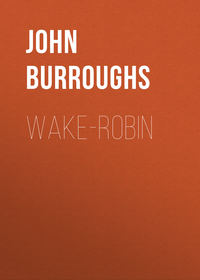 полная версия
полная версияWhitman: A Study
In Washington I knew Whitman intimately from the fall of 1863 to the time he left in 1873. In Camden I visited him yearly after that date, usually in the late summer or fall. I will give one glimpse of him from my diary, under date of August 18, 1887. I reached his house in the morning, before he was up. Presently he came slowly down stairs and greeted me. "Find him pretty well, – looking better than last year. With his light-gray suit, and white hair, and fresh pink face, he made a fine picture. Among other things, we talked of the Swinburne attack (then recently published). W. did not show the least feeling on the subject, and, I clearly saw, was absolutely undisturbed by the article. I told him I had always been more disturbed by S.'s admiration for him than I was now by his condemnation. By and by W. had his horse hitched up, and we started for Glendale, ten miles distant, to see young Gilchrist, the artist. A fine drive through a level farming and truck-gardening country; warm, but breezy. W. drives briskly, and salutes every person we meet, little and big, black and white, male and female. Nearly all return his salute cordially. He said he knew but few of those he spoke to, but that, as he grew older, the old Long Island custom of his people, to speak to every one on the road, was strong upon him. One tipsy man in a buggy responded, 'Why, pap, how d' ye do, pap?' etc. We talked of many things. I recall this remark of W., as something I had not before thought of, that it was difficult to see what the old feudal world would have come to without Christianity: it would have been like a body acted upon by the centrifugal force without the centripetal. Those haughty lords and chieftains needed the force of Christianity to check and curb them, etc. W. knew the history of many prominent houses on the road: here a crazy man lived, with two colored men to look after him; there, in that fine house among the trees, an old maid, who had spent a large fortune on her house and lands, and was now destitute, yet she was a woman of remarkable good sense, etc. We returned to Camden before dark, W. apparently not fatigued by the drive of twenty miles."
In death what struck me most about the face was its perfect symmetry. It was such a face, said Mr. Conway, as Rembrandt would have selected from a million. "It is the face of an aged loving child. As I looked, it was with the reflection that, during an acquaintance of thirty-six years, I never heard from those lips a word of irritation, or depreciation of any being. I do not believe that Buddha, of whom he appeared an avatar, was more gentle to all men, women, children, and living things."
IXFor one of the best pen-sketches of Whitman in his old age we are indebted to Dr. J. Johnston, a young Scotch physician of Bolton, England, who visited Whitman in the summer of 1890. I quote from a little pamphlet which the doctor printed on his return home: —
"The first thing about himself that struck me was the physical immensity and magnificent proportions of the man, and, next, the picturesque majesty of his presence as a whole.
"He sat quite erect in a great cane-runged chair, cross-legged, and clad in rough gray clothes, with slippers on his feet, and a shirt of pure white linen, with a great wide collar edged with white lace, the shirt buttoned about midway down his breast, the big lapels of the collar thrown open, the points touching his shoulders, and exposing the upper portion of his hirsute chest. He wore a vest of gray homespun, but it was unbuttoned almost to the bottom. He had no coat on, and his shirt sleeves were turned up above the elbows, exposing most beautifully shaped arms, and flesh of the most delicate whiteness. Although it was so hot, he did not perspire visibly, while I had to keep mopping my face. His hands are large and massive, but in perfect proportion to the arms; the fingers long, strong, white, and tapering to a blunt end. His nails are square, showing about an eighth of an inch separate from the flesh, and I noticed that there was not a particle of impurity beneath any of them. But his majesty is concentrated in his head, which is set with leonine grace and dignity upon his broad, square shoulders; and it is almost entirely covered with long, fine, straggling hair, silvery and glistening, pure and white as sunlit snow, rather thin on the top of his high, rounded crown, streaming over and around his large but delicately-shaped ears, down the back of his big neck; and, from his pinky-white cheeks and top lip, over the lower part of his face, right down to the middle of his chest, like a cataract of materialized, white, glistening vapor, giving him a most venerable and patriarchal appearance. His high, massive forehead is seamed with wrinkles. His nose is large, strong, broad, and prominent, but beautifully chiseled and proportioned, almost straight, very slightly depressed at the tip, and with deep furrows on each side, running down to the angles of the mouth. The eyebrows are thick and shaggy, with strong, white hair, very highly arched and standing a long way above the eyes, which are of a light blue with a tinge of gray, small, rather deeply set, calm, clear, penetrating, and revealing unfathomable depths of tenderness, kindness, and sympathy. The upper eyelids droop considerably over the eyeballs. The lips, which are partly hidden by the thick, white mustache, are full. The whole face impresses one with a sense of resoluteness, strength, and intellectual power, and yet withal a winning sweetness, unconquerable radiance, and hopeful joyousness. His voice is highly pitched and musical, with a timbre which is astonishing in an old man. There is none of the tremor, quaver, or shrillness usually observed in them, but his utterance is clear, ringing, and most sweetly musical. But it was not in any one of these features that his charm lay so much as in his tout ensemble, and the irresistible magnetism of his sweet, aromatic presence, which seemed to exhale sanity, purity, and naturalness, and exercised over me an attraction which positively astonished me, producing an exaltation of mind and soul which no man's presence ever did before. I felt that I was here face to face with the living embodiment of all that was good, noble, and lovable in humanity."
XBritish critics have spoken of Whitman's athleticism, his athletic temperament, etc., but he was in no sense a muscular man, an athlete. His body, though superb, was curiously the body of a child; one saw this in its form, in its pink color, and in the delicate texture of the skin. He took little interest in feats of strength, or in athletic sports. He walked with a slow, rolling gait, indeed, moved slowly in all ways; he always had an air of infinite leisure. For several years, while a clerk in the Attorney-General's Office in Washington, his exercise for an hour each day consisted in tossing a few feet into the air, as he walked, a round, smooth stone, of about one pound weight, and catching it as it fell. Later in life, and after his first paralytic stroke, when in the woods, he liked to bend down the young saplings, and exercise his arms and chest in that way. In his poems much emphasis is laid upon health, and upon purity and sweetness of body, but none upon mere brute strength. This is what he says "To a Pupil: " —
1. Is reform needed? Is it through you?The greater the reform needed, the greater the Personality you need to accomplish it.2. You! do you not see how it would serve to have eyes, blood, complexion, clean and sweet?Do you not see how it would serve to have such a body and Soul, that when you enter the crowd,an atmosphere of desire and command enters with you, and every one is impressedwith your personality?3. O the magnet! the flesh over and over!Go, mon cher! if need be, give up all else, and commence to-day to inure yourself to pluck, reality,self-esteem, definiteness, elevatedness,Rest not, till you rivet and publish yourself of your own personality.It is worthy of note that Whitman's Washington physician said he had one of the most thoroughly natural physical systems he had ever known, – the freest, probably, from extremes or any disproportion; which answers to the perfect sanity which all his friends must have felt with regard to his mind.
A few years ago a young English artist stopping in this country made several studies of him. In one of them which he showed me, he had left the face blank, but had drawn the figure from the head down with much care. It was so expressive, so unmistakably Whitman, conveyed so surely a certain majesty and impressiveness that pertained to the poet physically, that I looked upon it with no ordinary interest. Every wrinkle in the garments seemed to proclaim the man. Probably a similar painting of any of one's friends would be more or less a recognizable portrait, but I doubt if it would speak so emphatically as did this incomplete sketch. I thought it all the more significant in this case because Whitman laid such stress upon the human body in his poems, built so extensively upon it, curiously identifying it with the soul, and declaring his belief that if he made the poems of his body and of mortality he would thus supply himself with the poems of the soul and of immortality. "Behold," he says, "the body includes and is the meaning, the main concern, and includes and is the soul; whoever you are, how superb and how divine is your body, or any part of it!" He runs this physiological thread all through his book, and strings upon it many valuable lessons and many noble sentiments. Those who knew him well, I think, will agree with me that his bodily presence was singularly magnetic, restful, and positive, and that it furnished a curious and suggestive commentary upon much there is in his poetry.
The Greeks, who made so much more of the human body than we do, seem not to have carried so much meaning, so much history, in their faces as does the modern man; the soul was not concentrated here, but was more evenly distributed over the whole body. Their faces expressed repose, harmony, power of command. I think Whitman was like the Greeks in this respect. His face had none of the eagerness, sharpness, nervousness, of the modern face. It had but few lines, and these were Greek. From the mouth up, the face was expressive of Greek purity, simplicity, strength, and repose. The mouth was large and loose, and expressive of another side of his nature. It was a mouth that required the check and curb of that classic brow.
And the influence of his poems is always on the side of physiological cleanliness and strength, and severance from all that corrupts and makes morbid and mean. He says the "expression of a well-made man appears not only in his face: it is in his limbs and joints also; it is curiously in the joints of his hips and wrists; it is in his walk, the carriage of his neck, the flex of his waist and knees; dress does not hide him; the strong, sweet, supple quality he has strikes through the cotton and flannel; to see him pass conveys as much as the best poem, perhaps more. You linger to see his back, and the back of his neck and shoulder-side." He says he has perceived that to be with those he likes is enough: "To be surrounded by beautiful, curious, breathing, laughing flesh is enough, – I do not ask any more delight; I swim in it, as in a sea. There is something in staying close to men and women and looking on them, and in the contact and odor of them, that pleases the soul well. All things please the soul, but these please the soul well." Emerson once asked Whitman what it was he found in the society of the common people that satisfied him so; for his part, he could not find anything. The subordination by Whitman of the purely intellectual to the human and physical, which runs all through his poems and is one source of their power, Emerson, who was deficient in the sensuous, probably could not appreciate.
XIThe atmosphere of Whitman personally was that of a large, tolerant, tender, sympathetic, restful man, easy of approach, indifferent to any special social or other distinctions and accomplishments that might be yours, and regarding you from the start for yourself alone.
Children were very fond of him; and women, unless they had been prejudiced against him, were strongly drawn toward him. His personal magnetism was very great, and was warming and cheering. He was rich in temperament, probably beyond any other man of his generation, – rich in all the purely human and emotional endowments and basic qualities. Then there was a look about him hard to describe, and which I have seen in no other face, – a gray, brooding, elemental look, like the granite rock, something primitive and Adamic that might have belonged to the first man; or was it a suggestion of the gray, eternal sea that he so loved, near which he was born, and that had surely set its seal upon him? I know not, but I feel the man with that look is not of the day merely, but of the centuries. His eye was not piercing, but absorbing, – "draining" is the word happily used by William O'Connor; the soul back of it drew things to himself, and entered and possessed them through sympathy and personal force and magnetism, rather than through mere intellectual force.
XIIWalt Whitman was of the people, the common people, and always gave out their quality and atmosphere. His commonness, his nearness, as of the things you have always known, – the day, the sky, the soil, your own parents, – were in no way veiled, or kept in abeyance, by his culture or poetic gifts. He was redolent of the human and the familiar. Though capable, on occasions, of great pride and hauteur, yet his habitual mood and presence was that of simple, average, healthful humanity, – the virtue and flavor of sailors, soldiers, laborers, travelers, or people who live with real things in the open air. His commonness rose into the uncommon, the extraordinary, but without any hint of the exclusive or specially favored. He was indeed "no sentimentalist, no stander above men and women or apart from them."
The spirit that animates every page of his book, and that it always effuses, is the spirit of common, universal humanity, – humanity apart from creeds, schools, conventions, from all special privileges and refinements, as it is in and of itself in its relations to the whole system of things, in contradistinction to the literature of culture which effuses the spirit of the select and exclusive.
His life was the same. Walt Whitman never stood apart from or above any human being. The common people – workingmen, the poor, the illiterate, the outcast – saw themselves in him, and he saw himself in them: the attraction was mutual. He was always content with common, unadorned humanity. Specially intellectual people rather repelled him; the wit, the scholar, the poet, must have a rich endowment of the common, universal, human attributes and qualities to pass current with him. He sought the society of boatmen, railroad men, farmers, mechanics, printers, teamsters, mothers of families, etc., rather than the society of professional men or scholars. Men who had the quality of things in the open air – the virtue of rocks, trees, hills – drew him most; and it is these qualities and virtues that he has aimed above all others to put into his poetry, and to put them there in such a way that he who reads must feel and imbibe them.
The recognized poets put into their pages the virtue and quality of the fine gentleman, or of the sensitive, artistic nature: this poet of democracy effuses the atmosphere of fresh, strong Adamic man, – man acted upon at first hand by the shows and forces of universal nature.
If our poet ever sounds the note of the crude, the loud, the exaggerated, he is false to himself and to his high aims. I think he may be charged with having done so a few times, in his earlier work, but not in his later. In the 1860 edition of his poems stands this portraiture, which may stand for himself, with one or two features rather overdrawn: —
"His shape arisesArrogant, masculine, naïve, rowdyish,Laugher, weeper, worker, idler, citizen, countryman,Saunterer of woods, stander upon hills, summer swimmer in rivers or by the sea,Of pure American breed, of reckless health, his body perfect, free from taint from top to toe, free foreverfrom headache and dyspepsia, clean-breathed,Ample-limbed, a good feeder, weight a hundred and eighty pounds, full-blooded, six feet high, forty inchesround the breast and back,Countenance sunburnt, bearded, calm, unrefined,Reminder of animals, meeter of savage and gentleman on equal terms,Attitudes lithe and erect, costume free, neck gray and open, of slow movement on foot,Passer of his right arm round the shoulders of his friends, companion of the street,Persuader always of people to give him their sweetest touches, and never their meanest.A Manhattanese bred, fond of Brooklyn, fond of Broadway, fond of the life of the wharves and the great ferries,Enterer everywhere, welcomed everywhere, easily understood after all,Never offering others, always offering himself, corroborating his phrenology,Voluptuous, inhabitive, combative, conscientious, alimentive, intuitive, of copious friendship, sublimity,firmness, self-esteem, comparison, individuality, form, locality, eventuality,Avowing by life, manners, words to contribute illustrations of results of These States,Teacher of the unquenchable creed namely egotism,Inviter of others continually henceforth to try their strength against his."XIIIWhitman was determined, at whatever risk to his own reputation, to make the character which he has exploited in his poems a faithful compend of American humanity, and to do this the rowdy element could not be entirely ignored. Hence he unflinchingly imputes it to himself, as, for that matter, he has nearly every sin and dereliction mankind are guilty of.
Whitman developed slowly and late upon the side that related him to social custom and usage, – to the many fictions, concealments, make-believes, and subterfuges of the world of parlors and drawing-rooms. He never was an adept in what is called "good form;" the natural man that he was shows crude in certain relations. His publication of Emerson's letter with its magnificent eulogium of "Leaves of Grass" has been much commented upon. There may be two opinions as to the propriety of his course in this respect: a letter from a stranger upon a matter of public interest is not usually looked upon as a private letter. Emerson never spoke with more felicity and penetration than he does in this letter; but it is for Whitman's own sake that we would have had him practice self-denial in the matter; he greatly plumed himself upon Emerson's endorsement, and was guilty of the very bad taste of printing a sentence from the letter upon the cover of the next edition of his book. Grant that it showed a certain crudeness, unripeness, in one side of the man; later in life, he could not have erred in this way. Ruskin is reported saying that he never in his life wrote a letter to any human being that he would not be willing should be posted up in the market-place, or cried by the public crier through the town. But Emerson was a much more timid and conforming man than Ruskin, and was much more likely to be shocked by such a circumstance.
It has been said that the publication of this letter much annoyed Emerson, and that he never forgave Whitman the offense. That he was disturbed by it and by the storm that arose there can be little doubt; but there is no evidence that he allowed the fact to interfere with his friendship for the poet. Charles W. Eldridge, who personally knew of the relations of the two men, says: —
"There was not a year from 1855 (the date of the Emerson letter and its publication) down to 1860 (the year Walt came to Boston to supervise the issue of the Thayer & Eldridge edition of 'Leaves of Grass'), that Emerson did not personally seek out Walt at his Brooklyn home, usually that they might have a long symposium together at the Astor House in New York. Besides that, during these years Emerson sent many of his closest friends, including Alcott and Thoreau, to see Walt, giving them letters of introduction to him. This is not the treatment usually accorded a man who has committed an unpardonable offense.
"I know that afterwards, during Walt's stay in Boston, Emerson frequently came down from Concord to see him, and that they had many walks and talks together, these conferences usually ending with a dinner at the American House, at that time Emerson's favorite Boston hotel. On several occasions they met by appointment in our counting-room. Their relations were as cordial and friendly as possible, and it was always Emerson who sought out Walt, and never the other way, although, of course, Walt appreciated and enjoyed Emerson's companionship very much. In truth, Walt never sought the company of notables at all, and was always very shy of purely literary society. I know that at this time Walt was invited by Emerson to Concord, but declined to go, probably through his fear that he would see too much of the literary coterie that then clustered there, chiefly around Emerson."
XIVWhitman gave himself to men as men and not as scholars or poets, and gave himself purely as a man. While not specially averse to meeting people on literary or intellectual grounds, yet it was more to his taste to meet on the broadest, commonest, human grounds. What you had seen or felt or suffered or done was of much more interest to him than what you had read or thought; your speculation about the soul interested him less than the last person you had met, or the last chore you had done.
Any glimpse of the farm, the shop, the household – any bit of real life, anything that carried the flavor and quality of concrete reality – was very welcome to him; herein, no doubt, showing the healthy, objective, artist mind. He never tired of hearing me talk about the birds or wild animals, or my experiences in camp in the woods, the kind of characters I had met there, and the flavor of the life of remote settlements in Maine or Canada. His inward, subjective life was ample of itself; he was familiar with all your thoughts and speculations beforehand: what he craved was wider experience, – to see what you had seen, and feel what you had felt. He was fond of talking with returned travelers and explorers, and with sailors, soldiers, mechanics; much of his vast stores of information upon all manner of subjects was acquired at firsthand, in the old way, from the persons who had seen or done or been what they described or related.
He had almost a passion for simple, unlettered humanity, – an attraction which specially intellectual persons will hardly understand. Schooling and culture are so often purchased at such an expense to the innate, fundamental human qualities! Ignorance, with sound instincts and the quality which converse with real things imparts to men, was more acceptable to him than so much of our sophisticated knowledge, or our studied wit, or our artificial poetry.
XVAt the time of Whitman's death, one of our leading literary journals charged him with having brought on premature decay by leading a riotous and debauched life. I hardly need say that there was no truth in the charge. The tremendous emotional strain of writing his "Leaves," followed by his years of service in the army hospitals, where he contracted blood-poison, resulted at the age of fifty-four in the rupture of a small blood-vessel in the brain, which brought on partial paralysis. A sunstroke during his earlier manhood also played its part in the final break-down.
That, tried by the standard of the lives of our New England poets, Whitman's life was a blameless one, I do not assert; but that it was a sane, temperate, manly one, free from excesses, free from the perversions and morbidities of a mammonish, pampered, over-stimulated age, I do believe. Indeed, I may say I know. The one impression he never failed to make – physically, morally, intellectually – on young and old, women and men, was that of health, sanity, sweetness. This is the impression he seems to have made upon Mr. Howells, when he met the poet at Pfaff's early in the sixties.
The critic I have alluded to inferred license in the man from liberty in the poet. He did not have the gumption to see that Whitman made the experience of all men his own, and that his scheme included the evil as well as the good; that especially did he exploit the unloosed, all-loving, all-accepting natural man, – the man who is done with conventions, illusions and all morbid pietisms, and who gives himself lavishly to all that begets and sustains life. Yet not the natural or carnal man for his own sake, but for the sake of the spiritual meanings and values to which he is the key. Indeed, Whitman is about the most uncompromising spiritualist in literature; with him, all things exist by and for the soul. He felt the tie of universal brotherhood, also, as few have felt it. It was not a theory with him, but a fact that shaped his life and colored his poems. "Whoever degrades another degrades me," and the thought fired his imagination.









